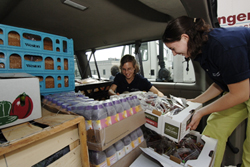Student Food Rescue Program Named the Best in America
The Student Food Rescue program, run through BU’s Community Service Center, is the most effective student-run food rescue program in the country. Each two-hour rescue run proves it.

On a Thursday morning in July, the residents of Kenmore Abbey, a low-income senior housing facility in Kenmore Square, are awaiting 50 pounds of potatoes, 10 pallets of bread, a box of grapes, and a large quantity of cabbage. In a warehouse in Dorchester, Becca Kahn (COM’05) and Liz Foley (SED’06) are preparing for the delivery by inspecting each loaf of bread for mold and ensuring every single spud is healthy and ready to use.
The two students are program managers with the University’s Student Food Rescue group, a food-salvage operation that collects excess food from retailers and restaurants around the city and distributes it to shelters and food pantries. With 2 temperamental vans and more than 50 volunteers, Student Food Rescue operates 17 “food runs” a week during the school year and 13 a week during the summer, collecting 150,000 pounds of food each year and feeding an estimated 1,000 people every week.
The organization was founded in 1988 and since then has grown to be the most successful and consistent student-coordinated food salvage program in the country. It was recently recognized as such by the National Student Campaign Against Hunger and Homelessness, a recognition students hope will strengthen the organization’s volunteer base. They attribute their success to the financial and logistical support they receive from the University’s Community Service Center — and also to the enthusiasm of the volunteers. “The people involved have a passion for it,” says Kahn. “When you see the people that you’re feeding, it makes a big difference.”
The majority of the runs put the students in direct contact with both donors and recipients, and since each team of volunteers is assigned to the same two-hour run each week, connections develop between the students and the communities they serve. On this Thursday morning, the ninth run of the week, Kahn and Foley, who have already worked a combined 14 hours this week, pick up the CSC’s silver van from the Fuller Building parking lot and drive to Fair Foods, a Dorchester nonprofit organization that receives bulk shipments from supermarkets. The food is safe to eat, but is too near its expiration date to languish on store shelves. At the shelters and food pantries, there’s little chance it will sit around. “The stuff here has a much faster turnover rate,” says Kahn.
When they arrive at Fair Foods, Kahn backs the van into a loading area, throws open the rear doors, and they get to work. Aided by volunteers and Fair Foods staff members, the students fill the van with bread, bagels, muffins, hot dog and hamburger rolls, grapes, cabbage, cucumbers, potatoes, bagged salads, and a box of Odwalla juices — just over 600 pounds of food. Kahn and Foley flip the loaves of bread over to check for damage or mold before stacking them onto the pallets. Nancy Jamison, the founder of Fair Foods, offers an enthusiastic assessment of BU’s volunteers. “They have the best attitude of all the kids in the city,” she says.
When the van is full, the students head back to Commonwealth Avenue and Kenmore Abbey. Residents and staff at the facility will spread out the food in the basement and residents and visitors can do their grocery shopping. A dollar buys whatever can fit in a brown paper bag. “Within an hour, people will be down there,” says Foley.
They return to the Fuller Building just before noon, when the next volunteer team is scheduled to depart for a run to Community Servings, an organization that delivers meals to people with AIDS and other life-threatening illnesses. Other pickup points include Clear Flour Bakery, Bruegger’s Bagels, and Whole Foods, and food is also donated to the Allston Brighton Food Pantry, the Franklin Square House, the Boston Rescue Mission, and Rosie’s Place.
Students join the food rescue program for a variety of reasons, the program managers say; some sign up just because their friends are doing it. Nearly everyone who starts working with the program remains, says Sara DeRitter, a program coordinator at the CSC. “A lot of people get involved, and tend to stay,” she says.
The appeal, according to Foley, is simple: after picking up 600 pounds of food at Fair Foods, she can actually hand the provisions over to someone who needs them. “You get to see the big picture,” she says. “You get to see how the food actually makes a difference.”